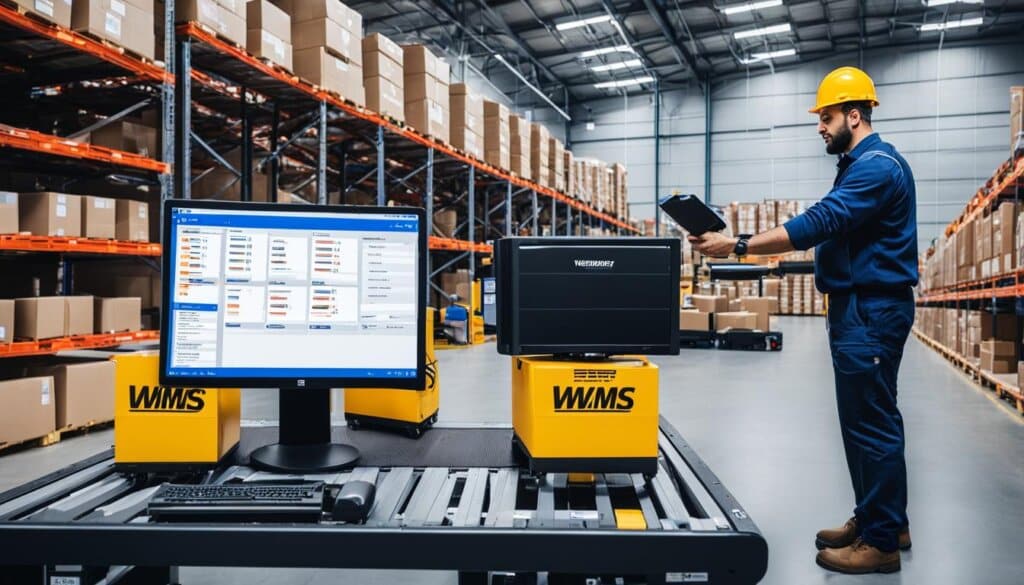Table of Contents
Welcome to our comprehensive guide on warehouse management systems (WMS). In this article, we will delve into the world of WMS and uncover its benefits, features, and role in the supply chain. Whether you are involved in e-commerce, third-party logistics, or manufacturing, understanding WMS is crucial for optimizing efficiency, reducing costs, and improving customer satisfaction.
So, let’s begin our journey into the realm of warehouse management systems and discover how they can revolutionize your warehouse operations.
What is a Warehouse Management System (WMS)?
A warehouse management system (WMS) is a centralised control tower that ensures goods are stored, managed, and dispatched efficiently. It plays a vital role in various industries, including e-commerce, third-party logistics, distribution, and manufacturing. By providing accurate inventory visibility and streamlining fulfillment operations, a WMS optimises warehouse processes to enhance overall efficiency and customer satisfaction.
A key function of a WMS is inventory tracking, which enables businesses to have real-time visibility into their stock levels. By accurately monitoring inventory, organizations can avoid stockouts and overstocks, leading to improved order fulfillment rates and reduced costs. Additionally, a WMS optimizes storage space by intelligently organizing products based on factors such as size, weight, and demand patterns. This ensures efficient use of available space, eliminates wasted areas, and allows for easier product location.
Order processing is another critical aspect managed by a WMS. It expedites order fulfillment by automating the picking, packing, and shipping processes. With a WMS, businesses can eliminate manual and time-consuming tasks, such as searching for products and manually recording shipment details. This leads to faster order turnaround times and increased productivity.
Overall, a warehouse management system streamlines warehouse operations, improves inventory accuracy, and enhances order fulfillment processes. By implementing a WMS, businesses can achieve higher operational efficiency, reduce costs, and meet customer demands with increased agility.
A warehouse management system (WMS) is a centralised control tower that ensures goods are stored, managed, and dispatched efficiently.
By providing accurate inventory visibility and streamlining fulfillment operations, a WMS optimises warehouse processes to enhance overall efficiency and customer satisfaction.
| Key Features of a WMS: | Benefits: |
|---|---|
| Inventory Tracking | – Accurate stock visibility – Reduces stockouts and overstocks |
| Storage Space Optimization | – Efficient use of available space – Eliminates wasted areas – Easy product location |
| Order Processing Automation | – Faster order fulfillment – Eliminates manual tasks – Increased productivity |
Realizing the full potential of a WMS
- Implementing a WMS can transform warehouse operations by providing a digital platform that optimizes processes and eliminates inefficiencies.
- Integrating a WMS with other systems, such as Enterprise Resource Planning (ERP), can further enhance operational visibility and data accuracy.
- Regularly updating and optimizing a WMS ensures it remains aligned with changing business needs and technological advancements.
- Training employees on using the WMS effectively is crucial to maximizing its benefits and ensuring smooth adoption across the organization.
Benefits of Warehouse Management System (WMS)
Warehouse management systems (WMS) provide a wide range of benefits that can significantly enhance business operations. By leveraging the power of digital technology, WMS streamlines warehouse processes, improves efficiency, and reduces costs. Let’s explore the key advantages of implementing a WMS in your organization.
Digitization of Warehouse Processes
One of the primary benefits of a WMS is the digitization of warehouse processes. By moving away from manual, paper-based systems, companies can automate tasks such as inventory tracking, order processing, and shipment management. This automation eliminates errors and improves accuracy, leading to improved efficiency and customer satisfaction.
Elimination of Manual Tasks
With a WMS in place, manual tasks become a thing of the past. The system automates various operations, such as data entry, cycle counts, and order picking, reducing the reliance on manual labor. This not only increases productivity but also frees up valuable time for warehouse staff to focus on more critical tasks.
Cost Reduction through Process Optimization
Implementing a WMS enables organizations to optimize their warehouse processes, leading to significant cost reductions. By improving inventory accuracy, reducing stockouts, and minimizing order returns, companies can operate more efficiently and minimize unnecessary expenses. Additionally, a WMS helps optimize labor allocation, reducing overtime costs and maximizing workforce productivity.
Enhanced Operational Visibility
Operational visibility is crucial for effective warehouse management. A WMS provides real-time insights into inventory levels, order statuses, and performance metrics. This visibility allows managers to make informed decisions, optimize workflows, and address bottlenecks promptly. With a comprehensive overview of warehouse operations, businesses can improve overall efficiency and customer satisfaction.
Improved Customer and Supplier Relations
A WMS plays a vital role in fostering strong relationships with both customers and suppliers. By ensuring accurate and timely order fulfillment, businesses can enhance customer satisfaction and loyalty. Moreover, by improving inventory visibility and streamlining communication with suppliers, a WMS enables seamless collaboration and reduces lead times, ultimately strengthening supplier relationships.
Scalability for Future Growth
As businesses evolve and expand, scalability becomes critical. A WMS provides the necessary flexibility to accommodate growth without disrupting operations. With the ability to handle increased order volumes, support multiple warehouses, and integrate with other systems, a WMS ensures that your warehouse management capabilities can grow alongside your business.
In summary, a warehouse management system (WMS) offers numerous benefits to businesses, including digitization of warehouse processes, elimination of manual tasks, cost reduction through process optimization, enhanced operational visibility, improved customer and supplier relations, and scalability for future growth. By implementing a WMS, businesses can enhance efficiency, accuracy, and flexibility in warehouse operations, leading to improved productivity and reduced costs.
How Warehouse Management Systems Fit in the Supply Chain
A warehouse management system (WMS) plays a crucial role in optimizing supply chain management by seamlessly integrating warehouse processes, inventory tracking, and order fulfillment. It acts as the backbone of efficient warehouse operations, ensuring accurate inventory management and timely delivery of products to customers.
One of the key functions of a WMS is managing order fulfillment processes. It streamlines the entire fulfillment workflow, from receiving orders to picking, packing, and shipping. By automating these processes, a WMS significantly reduces errors, improves order accuracy, and expedites order processing time.
Accurate inventory tracking is another essential aspect of a WMS. It provides real-time visibility into inventory levels, locations, and movements within the warehouse. With precise inventory data readily available, businesses can optimize stock levels, avoid stockouts or excess inventory, and efficiently allocate resources.
Efficient warehouse operations are vital for a smooth supply chain. A WMS facilitates effective warehouse management by optimizing space utilization, organizing product placement, and enforcing efficient picking and replenishment processes. By streamlining these operations, businesses can maximize productivity, minimize errors, and reduce operational costs.
By integrating suppliers, warehouses, and customers, a WMS enables seamless coordination and collaboration throughout the supply chain. It ensures smooth product movement from suppliers to warehouses and warehouses to customers. This integration eliminates silos, reduces communication gaps, and enhances overall supply chain efficiency.
In summary, a WMS is a key enabler in supply chain management. It improves order fulfillment processes, ensures accurate inventory tracking, and optimizes warehouse operations. By leveraging a WMS, businesses can achieve greater supply chain efficiency, reduce disruptions, and enhance customer satisfaction.

Key Benefits of a Warehouse Management System in the Supply Chain
| Benefits | Description |
|---|---|
| Improved Order Fulfillment | Streamlines order processing, reducing errors and improving accuracy. |
| Accurate Inventory Tracking | Provides real-time visibility into inventory levels, locations, and movements. |
| Optimized Warehouse Operations | Enables efficient space utilization, product placement, and picking processes. |
| Seamless Supply Chain Integration | Facilitates collaboration and coordination between suppliers, warehouses, and customers. |
| Enhanced Supply Chain Efficiency | Reduces disruptions, improves productivity, and minimizes operational costs. |
| Improved Customer Satisfaction | Enables timely deliveries and enhances overall customer experience. |
Types of Warehouse Management Systems (WMS)
Warehouse management systems (WMS) are available in different types and implementation methods to cater to the diverse needs of businesses. Let’s explore the various categories of WMS:
- Standalone WMS: This type of WMS operates independently and focuses solely on warehouse management functionalities. It provides comprehensive features for inventory control, order fulfillment, and warehouse optimization. Standalone WMS solutions are suitable for businesses that prioritize specific warehousing needs and require a dedicated platform to streamline their operations.
- ERP-integrated WMS: These WMS solutions are modules integrated within larger Enterprise Resource Planning (ERP) systems. By combining warehouse management capabilities with other business functions, such as finance, sales, and procurement, ERP-integrated WMS offers a holistic approach to enterprise management. This integration enables seamless data flow across departments, enhancing overall efficiency and collaboration.
- Cloud-based WMS: Cloud-based WMS solutions are gaining popularity due to their flexibility, scalability, and cost-effectiveness. These systems are hosted on cloud servers, eliminating the need for on-premises infrastructure. Cloud WMS offers easy accessibility from anywhere, enables rapid deployment, and allows businesses to pay for the services through a subscription model. It is an ideal choice for organizations looking for quick implementation, remote access, and scalability to meet dynamic business demands.
Customized WMS Solutions
In addition to the aforementioned types, organizations can also opt for customized WMS solutions tailored to their specific industry requirements and unique business processes. Whether it’s e-commerce, retail, manufacturing, or any other sector, WMS can be customized to address the specific challenges and demands of each industry.
“Choosing the right type of WMS is crucial for businesses as it determines the level of functionality, integration capabilities, and cost-effectiveness.”
When selecting a WMS, organizations need to consider factors such as the size of the warehouse, the complexity of operations, the volume and variety of goods being managed, and the need for integration with other systems. By carefully evaluating the requirements and understanding the available options, businesses can make an informed decision and implement a WMS that aligns perfectly with their operational needs.
| Type of WMS | Main Characteristics | Suitable for |
|---|---|---|
| Standalone WMS | Focused on warehouse management functionalities | Small to medium-sized businesses requiring dedicated warehouse optimization |
| ERP-integrated WMS | Integrated within larger ERP systems, seamless data flow across departments | Enterprises seeking holistic management solutions |
| Cloud-based WMS | Hosted on cloud servers, flexible, scalable, cost-effective | Businesses looking for rapid implementation, remote access, and scalability |
Features of Warehouse Management Systems (WMS)
Warehouse management systems (WMS) are equipped with a plethora of features that can greatly optimize warehouse operations. These features encompass various aspects of warehouse management, ranging from warehouse design customization to efficient inventory tracking and accurate order fulfillment. Let’s explore some of the key features that make WMS a valuable tool for businesses:
1. Warehouse Design Customization
WMS allows businesses to customize their warehouse design according to their specific needs and requirements. This feature enables the efficient utilization of available space, ensuring optimum storage capacity and streamlined workflows. By implementing a customized warehouse design within their WMS, businesses can maximize efficiency and minimize inventory handling costs.
2. Inventory Tracking through Barcode and RFID Technology
Efficient inventory tracking is crucial for maintaining inventory accuracy and meeting customer demands. WMS provides robust inventory tracking capabilities through the use of barcode and RFID (Radio-Frequency Identification) technology. This feature enables businesses to track inventory movements in real-time, ensuring accurate stock levels, reducing stockouts, and enhancing overall operational efficiency.
3. Picking and Packing Optimization
WMS optimizes the picking and packing process, streamlining order fulfillment operations. By utilizing advanced algorithms and automation, WMS helps warehouse personnel identify the most efficient picking routes and methods, reducing the time required to fulfill customer orders. This optimization improves order accuracy, reduces errors, and enhances customer satisfaction.
4. Shipping Automation
Shipping automation is another powerful feature offered by WMS. It enables businesses to automate the shipping process, from generating shipping labels to managing carrier selection and tracking shipping status. With WMS, businesses can eliminate manual paperwork, reduce shipping errors, and expedite the shipping process, resulting in faster delivery times and improved customer experience.
5. Labor Management Performance Monitoring
WMS includes labor management performance monitoring features that allow businesses to track and monitor the productivity of their warehouse staff. This feature provides valuable insights into individual and overall team performance, enabling businesses to identify areas of improvement, optimize resource allocation, and enhance overall warehouse efficiency.
6. Comprehensive Reporting Capabilities
WMS offers comprehensive reporting capabilities that provide businesses with valuable insights into their warehouse operations. These reports include key performance indicators (KPIs) such as order fulfillment rates, inventory accuracy, picking and packing efficiency, and shipping accuracy. By analyzing these reports, businesses can identify trends, make data-driven decisions, and continuously improve their warehouse management processes.
By leveraging these powerful features, WMS enhances efficiency, accuracy, and productivity in every aspect of warehouse management. From customized warehouse design to streamlined inventory tracking, picking and packing optimization, shipping automation, labor management performance monitoring, and detailed reporting capabilities, WMS empowers businesses to take control of their warehouse operations and achieve operational excellence.
Cloud-Based Warehouse Management Systems (WMS)
Cloud-based warehouse management systems (WMS) are revolutionizing the way businesses manage their inventories. With faster implementation, scalability, and lower costs compared to traditional on-premises solutions, cloud WMS offers numerous benefits for organizations of all sizes.
One of the key advantages of cloud WMS is its scalability. Unlike traditional systems that require significant investments in hardware and infrastructure, cloud WMS can easily scale up or down based on business needs. This flexibility allows businesses to adapt to seasonal fluctuations, sudden changes in demand, or expansion into new markets without the hassle and cost of upgrading hardware or software.
Cloud-based WMS also offers lower upfront costs compared to on-premises solutions. With cloud WMS, businesses can eliminate the need for expensive hardware installations and maintenance. Instead, they can pay a monthly subscription fee based on their usage, making it a cost-effective choice, especially for small and medium-sized enterprises.
Additionally, cloud WMS provides faster return on investment (ROI) due to quicker implementation times. Cloud-based systems can be deployed and configured more rapidly than their on-premises counterparts, reducing the time it takes to start reaping the benefits of improved warehouse management. This shorter implementation period allows businesses to realize cost savings and operational efficiencies sooner.
Another significant advantage of cloud WMS is the ease of upgrades and maintenance. With cloud-based solutions, updates and maintenance tasks are handled by the service provider, meaning businesses can focus on their core operations without disruptions. Upgrades are seamlessly rolled out, ensuring businesses always have access to the latest features and enhancements.
In summary, cloud-based warehouse management systems offer greater scalability, lower costs, and faster implementation compared to on-premises solutions. These advantages make cloud WMS an attractive choice for businesses looking to optimize their warehouse operations and achieve cost savings.
The Evolution of Warehouse Management Systems (WMS)
Warehouse management systems (WMS) have undergone a remarkable transformation, from humble storage processes to cutting-edge digitized platforms. This evolution has been driven by advancements in transportation, commerce, and digital technology. Today, modern WMS solutions have become the backbone of efficient and productive warehouse operations.
Digitization has revolutionized WMS by automating manual tasks and introducing real-time visibility into inventory management. Gone are the days of relying on hand-written records and spreadsheets. With the use of advanced barcode and RFID technology, WMS enables accurate and seamless inventory tracking, reducing errors and improving overall efficiency.
Furthermore, modern WMS systems have enhanced control over warehouse operations, allowing businesses to optimize processes such as picking, packing, and shipping. Labor management systems integrated within WMS enable performance monitoring and enable businesses to make data-driven decisions. These advanced functionalities have significantly improved productivity and customer satisfaction in the supply chain.
In conclusion, the history of WMS reflects a remarkable journey from traditional storage processes to digitized systems. The evolution of WMS has brought about the digitization of warehouse operations, enabling businesses to adapt to changing market demands and achieve greater efficiency. As we move forward, WMS will continue to play a crucial role in shaping the future of modern warehousing.
FAQ
What is a warehouse management system (WMS)?
A warehouse management system (WMS) is an intelligent digital platform designed to enhance warehouse operations and streamline inventory management. It provides granular visibility and reporting capabilities to simplify warehousing activities at scale.
How does a warehouse management system (WMS) improve efficiency?
A warehouse management system is a centralized control tower that ensures goods are stored, managed, and dispatched efficiently. It tracks inventory, optimizes storage space, and expedites order processing.
What industries can benefit from a warehouse management system (WMS)?
Warehouse management systems play a vital role in various industries, including e-commerce, third-party logistics, distribution, and manufacturing, by providing accurate inventory visibility and streamlining fulfillment operations.
What are the benefits of using a warehouse management system (WMS)?
Warehouse management systems offer numerous benefits to businesses, including digitization of warehouse processes, elimination of manual tasks, cost reduction through process optimization, enhanced operational visibility, improved customer and supplier relations, and scalability for future growth.
How does a warehouse management system (WMS) contribute to supply chain management?
A WMS plays a vital role in supply chain management by managing order fulfillment processes, ensuring accurate inventory tracking, and facilitating efficient warehouse operations. It enables seamless coordination and integration between suppliers, warehouses, and customers, ensuring smooth product movement and timely deliveries.
What are the different types of warehouse management systems (WMS)?
Warehouse management systems come in various types and implementation methods. They can be standalone systems, modules within larger ERP systems, or cloud-based solutions. The type of WMS depends on the size and nature of the organization.
What features does a warehouse management system (WMS) offer?
Warehouse management systems offer a range of features to optimize warehouse operations. These include warehouse design customization, inventory tracking through barcode and RFID technology, picking and packing optimization, shipping automation, labor management performance monitoring, and comprehensive reporting capabilities.
What are the advantages of using a cloud-based warehouse management system (WMS)?
Cloud-based warehouse management systems are becoming increasingly popular due to their faster implementation, lower costs, scalability, and easier upgrade processes. They eliminate the need for on-premises infrastructure and provide flexibility and agility for growing businesses.
How have warehouse management systems (WMS) evolved over time?
Warehouse management systems have evolved from simple storage processes to digitized systems that leverage advancements in transportation, commerce, and digital technology. Modern WMS solutions automate manual processes, enhance inventory control, and provide real-time visibility into warehouse operations.













